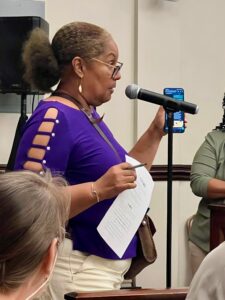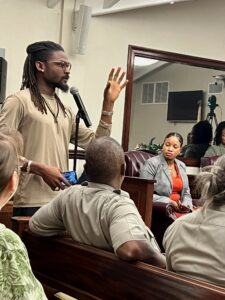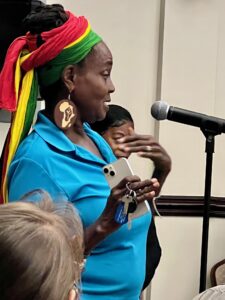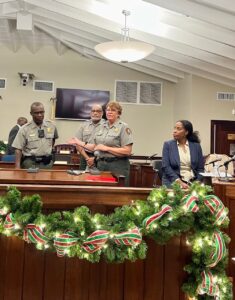
Delegate Stacey Plaskett convoked a town hall meeting held in person on St. John and online Tuesday night to discuss H.R. 3025, federal legislation she proposed in April to limit the size of the Virgin Islands National Park.
But few of the St. John residents who spoke out at the Legislative Annex in Cruz Bay even mentioned H.R. 3025. Instead, eight ancestral St. Johnians spoke passionately about their troubled relationship with the National Park Service.
Much of controversy is based on decades-old disputes at Bordeaux Mountain and elsewhere about boundaries and land ownership of properties claimed by the Virgin Islands National Park.
One of the first to testify on Tuesday was Lorelei Monsanto, who said her mother, Wilma Marsh Monsanto, fought tirelessly to rectify land disputes with the National Park Service. “The park has stolen our land,” she said. “They still owe us 300 acres. My mother had old maps that proved our boundaries. We have had to spend our time and money to fight to get our land back. It could end amicably, or it could end another way.”

Monsanto said federal law calls for all original government surveys to be recorded, and she had long ago requested that a listing of every parcel of land within the Virgin Islands National Park be sent to Plaskett’s office.
Plaskett said she has not received that information.
Abigail Hendricks, who described herself as a fifth-generation St. Johnian, said she was in “a passionate love-hate relationship with the park” because her family had lost property near Salt Pond when the boundaries for the VINP were established in 1956. “This is our truth,” said Hendricks, turning to look at officials from the Virgin Islands National Park who attended the meeting.
Hendricks said St. Johnian landowners are forced to pay taxes on properties that were once accessible by dirt roads and trails but are now essentially “landlocked” — surrounded by parkland that is preserved from development. She called for roads within the park to be reopened.

Kurt Marsh called on Plaskett to establish a task force in cooperation with the Office of the Lt. Governor to help St. John families involved with boundary disputes. “If we have maps and deeds that go back to 1835, we don’t have to prove anything to anybody. The park must show what they own by way of deed.”
Towards the end of the meeting, Plaskett charged Marsh with identifying someone on St. John who could lead such a task force.
Elsa Alvear, a VINP official in charge of environmental planning and compliance, said the VINP had drafted a proposal to request expert assistance from the NPS’ regional office to address land access disputes; however, funding for the proposal is competitive, and the process would take years to complete.
Marsh also brought up the long-standing issue that government property — whether local or federal — is exempt from taxation. He said his family pays roughly $25,000 in property taxes for 130 acres, while the National Park Service makes a contribution of only about $35,000 annually for the nearly 7,500 acres it owns.
For years, St. John residents have pointed out that if the park would pay taxes based on the market value of their property, the territory could better afford to build schools, hospitals, roads, and affordable housing. However, the issue is moot. Exempting government property from taxation is unlikely to change as it is so firmly entrenched throughout the United States.
At the heart of the complaints is the skyrocketing property values on St. John. According to Cruz Bay Realty’s website, in 2023, the average price paid for a piece of undeveloped property was $368,033, and the average sales price for a home was $1,764,236.
In 1992, the average price for a piece of undeveloped land on St. John was $122,365, and the average sales price for a home was $363,750.
There is the feeling among locals now that only investors from elsewhere can afford to buy and develop property to start a business; even worse, St. Johnians can no longer afford to live on St. John.

At Tuesday’s meeting, Doris Fleming said her grandfather sold his land, and now she cannot afford to buy property on St. John. “I do rage because of that,” she said. “What are our little children going to do?”
It’s largely for this reason that Plaskett crafted H.R. 3025, which is designed to keep the park from expanding its acreage. “The park has been brought to a size that I, and others, believe is untenable, she said.
At one point during the meeting, Plaskett said to the audience, “I feel your pain. My family’s land was taken away, too, because we trusted someone who said they’d pay taxes — someone who looked like us — and now HOVENSA sits on that property.”
Under Plaskett’s proposal, if someone wants to sell or donate property to the Virgin Islands National Park, the Secretary of the Interior Department, which oversees the National Park Service, “shall convey out of federal ownership an equal acreage of federal land in the park, via sale, exchange, or donation.”
At Tuesday’s meeting, Pam Gaffin, a St. John resident who has spent years studying the land values on St. John, said it was important that Plaskett’s bill define the exact amount of acreage owned by the park, a quantity that is unknown because of disputes.

Plaskett responded that the bill could move forward without specifying the exact acreage and boundaries; the proposed law simply says that any new land acquired by the park must be offset by an equal amount being removed.
Plaskett said she was working with members of the House of Representatives Natural Resources Committee to move the legislation forward. However, she was concerned that the House has been slow to pass legislation. Despite the fact that the House has held hearings on more than 700 proposals, only 27 bills have been approved this year, according to the New York Times.
Furthermore, in order for Plaskett’s bill to move forward, a companion bill must be approved by the U.S. Senate. The fact that the territory has no representation in the U.S. Senate “has been a problem for us,” Plaskett said, adding, “Neither does Puerto Rico, and they have three million people.”


